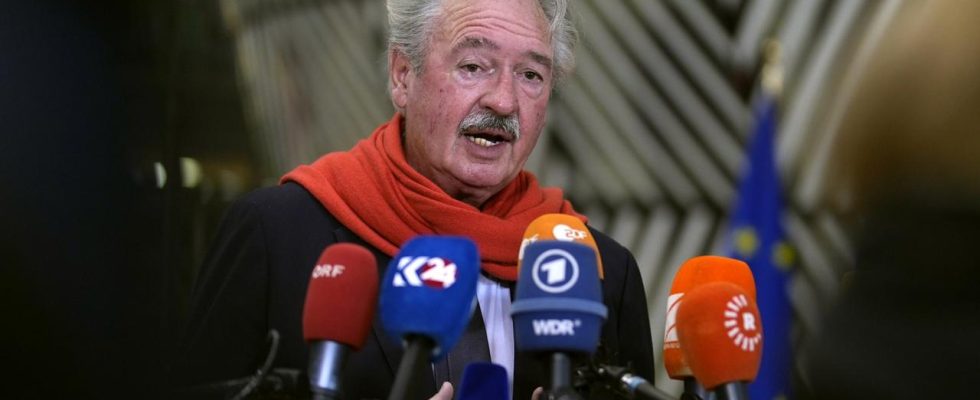portrait
Jean Asselborn, the EU’s longest-serving foreign minister, is stepping down. For 19 years, Luxembourg’s chief diplomat fought for fundamental values - sometimes with humor, sometimes with strong expressions, depending on the situation.
He could also have taken a racing bike – but the ambitious recreational athlete Jean Asselborn is on his way to what will probably be his last EU Foreign Affairs Council this early Monday morning. So he wears a suit and sits in a company car with his spokesman. “It’s always the last day – it’s a working day, but of course it’s not a day like any other,” he says.
Once again the full program: The long red carpet, at the end of the left-hand bend the cameras are behind a barrier. For two decades, Luxembourg’s foreign minister has spoken his assessments into the microphones here. Clear words are the 74-year-old’s trademark – not a given in the world of high diplomacy.
The currently longest-serving foreign minister in the European Union is stepping down. Since the incumbent government’s election defeat, it has been clear that he will resign from office. This marks the end of 19 uninterrupted years as chief diplomat of the Grand Duchy of Luxembourg. During this time he was a frequently invited guest on TV talk shows and radio programs in Germany. He proved that the voice from the second smallest EU country can have weight, even if not everyone wanted to hear his words.
Hand in hand before parting: Asselborn and EU chief diplomat Josep Borrell.
Someone who can dish it out
In 2016, for example, Asselborn harshly criticized Hungary and Prime Minister Viktor Orban: “Here, people fleeing war are treated almost worse than wild animals.” Anyone who builds fences against war refugees, violates freedom of the press and the independence of the judiciary should be temporarily or permanently “expelled from the EU”.
Asselborn was “arrogant and frustrated,” replied Hungary’s Foreign Minister Péter Szijjártó. But criticism also came from the EU Parliament. At the time, CSU man Manfred Weber spoke of a “nonsensical ghost debate”. The Greens said it was a “cheap demand”.
When it comes to his fundamental beliefs, Asselborn can be even more explicit. This is also shown by a dispute in 2018, which only became public because the then Italian Interior Minister Matteo Salvini had a confidential EU meeting secretly filmed and later posted online. The right-wing populist politician had said that he would rather help Italians have more children than bring “new slaves” to Europe. The Luxembourger didn’t want to leave it like that. He angrily tore off the headphones with the translation and shouted “Merde alors!”, in German: “Shit again!”. He later said that he could no longer hear this “stupid chatter.”
His heartfelt topic: migration
Asselborn has no problem with cameras: in the documentary “Foreign Affairs” you can see him sitting on the UN Security Council in one scene, shortly afterwards he utters curses while gardening in shorts because the lawnmower won’t start. The Luxembourg media professional consciously shows himself to be a close neighbor. A scene that shouldn’t be missed: the 74-year-old as a passionate cyclist who struggles up the infamous Mont Ventoux in France once a year. The steelworker’s son, who worked his way up from school and university to the mayor’s office in his home town of Steinfort to the Foreign Ministry, is used to the hard way all his life.
Asselborn is a man of words, but what effect do his words have? In a portrait in the Luxembourg magazine “Reporter” in 2018, it was said that he carefully cultivated “his image as an idealistic admonisher”: “He is not interested in the criticism that he only warns and only rarely influences the direction of world politics.”
There is no doubt that he was far from able to convince all EU states, particularly in the area of migration, for which he is also responsible in the Luxembourg government. The Social Democrat has been concerned about the issue since he visited the island of Lesbos in 2015, where people regularly arrive in unseaworthy boats: He reports on fenced-in children and empty eyes.
Asselborn advocates responsibility and solidarity instead of national interests. And yet he experienced how decisions to redistribute refugees were ignored and how the EU’s common asylum policy did not make progress for a long time. His conclusion: “If we had only put 20 percent of the energy to prevent the financial crisis into the migration crisis, then Europe would be in a better position today.”
Asselborn was and is never at a loss for a saying – like here in a conversation with Federal Foreign Minister Annalena Baerbock.
Member of the Luxembourg Chamber
The rule of law, democracy, joint action in Europe: not every top politician can claim to have fought persistently for fundamental values over such a long period of time. And what can the foreign minister of a very small EU country rely on if not the power of his words?
Occasionally Asselborn’s friendly, humorous nature reached its limits. After the LuxLeaks revelations about controversial tax practices in his homeland that benefited corporations, he said: Anne Will: “As a small country, we don’t have space for so many houses, that’s why we have so many mailboxes.” A misplaced joke? Or at least the willingness to face the questions publicly? Definitely a typical Asselborn.
And in the future? In the most recent election, Jean Asselborn secured a place in the Luxembourg state parliament with very good results. So there will soon be significantly more kilometers on the bike and fewer talk shows? It is difficult to believe that his voice will not continue to be heard regularly throughout the EU.

